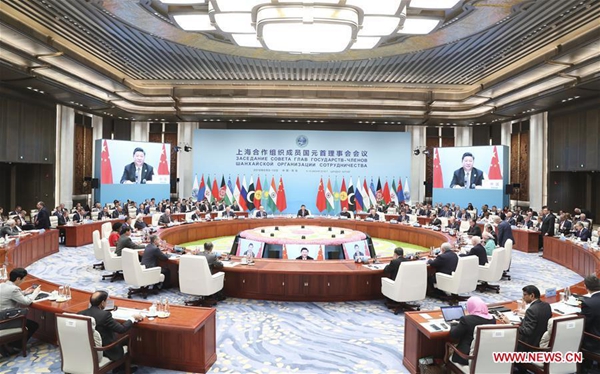SCO Qingdao declaration calls for common ground to face challenges
 0 Comment(s)
0 Comment(s) Print
Print E-mail Xinhua, June 11, 2018
E-mail Xinhua, June 11, 2018

Leaders of Shanghai Cooperation Organization (SCO) member states issued a declaration on Sunday at annual summit held in China's coastal city of Qingdao.
Amid the increasingly diverse and multi-polar geopolitical situation and growing uncertainties, the international community is in urgent need of seeking common ground and effectively coping with global challenges, said the document made public during the 18th Meeting of the Council of Heads of Member States.
SCO members have made "building a community with a shared future for humanity" a common concept, according to the document.
"The inclusion of India and Pakistan into the SCO has lifted cooperation in various areas to a new level," it said.
Member states reiterated their commitment to the Treaty on Long-Term Good-Neighborliness, Friendship and Cooperation of the SCO Member States and would continue to develop good-neighbourly relations and friendship in areas of common concern, including building shared borders into permanently peaceful and friendly ones.
"Some country or bloc unilaterally develops anti-missile systems in an unrestricted manner, denting global security and damaging world stability," said the document, stressing that ensuring one's own security should not come at the price of endangering other countries.
Member states proposed that a comprehensive United Nations treaty on fighting international terrorism should be passed by reaching a consensus based on UN documents such as the Charter of the United Nations.
"It is forbidden to interfere in other nations' internal affairs in the name of countering terrorism and extremism," it said.
Member states recognized the special role of the SCO regional counter-terrorist agencies in jointly combating the "three evil forces" of terrorism, separatism and extremism, and safeguarding regional security.
It is very important to improve these institutions' work, including development of a system to monitor and cope with potential threats in global information space, said the declaration.
"SCO members will continue to regularly hold joint anti-terrorism drills and coordinate efforts to crack down on the spreading of terrorism online," it added.
They are concerned about the rising threats posed by increased drug production, trafficking and use as well as the financing of terrorism through the drug business. "A common balanced position should be developed in combating illegal trafficking, including online trafficking of drugs and precursor chemicals."
SCO members support settlement of global conflicts by political and diplomatic means within the framework of basic codes and principles of international law to achieve general security and stability, said the document.
It is very important to keep implementing the comprehensive agreement on Iran nuclear issue, and the Korean Peninsula issue should be solved only through dialogue and consultation as well as political and diplomatic approaches, according to the declaration.
The SCO supported the peace initiative proposed by international society, including China and Russia, to mitigate the region's tension, promote denuclearization of the peninsula and maintain lasting peace in Northeast Asia.
"SCO members support dialogue and contact between the Democratic People's Republic of Korea (DPRK) and the Republic of Korea, and between the DPRK and the United States, and calls on all related parties to facilitate the development of dialogue," the declaration read.
They also support improvement of the global economic governance system and development of economic, trade and investment cooperation while opposing fragmentation of international trade relations and trade protectionism in any form.
Member states would enhance cooperation under the framework of current multilateral banks and financial institutions in the region, such as the SCO Interbank Consortium and the Asian Infrastructure Investment Bank to help finance regional cooperation projects, it said.
Fruitful multilateral and bilateral cooperation projects would be held in culture, education, science and technology, health, tourism, folk art and other fields to promote cultural communication and people-to-people exchanges, said the document.





